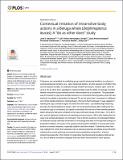Files in this item
Contextual imitation of intransitive body actions in a Beluga whale (Delphinapterus leucas) : a “do as other does” study
Item metadata
| dc.contributor.author | Abramson, José Z. | |
| dc.contributor.author | Hernández-Lloreda, Mª Victoria | |
| dc.contributor.author | Esteban, José-Antonio | |
| dc.contributor.author | Colmenares, Fernando | |
| dc.contributor.author | Aboitiz, Francisco | |
| dc.contributor.author | Call, Josep | |
| dc.date.accessioned | 2017-06-22T11:30:10Z | |
| dc.date.available | 2017-06-22T11:30:10Z | |
| dc.date.issued | 2017-06-21 | |
| dc.identifier | 250299387 | |
| dc.identifier | 54250451-2447-4085-a8fa-ac19e6a98329 | |
| dc.identifier | 85021183504 | |
| dc.identifier | 000404118300020 | |
| dc.identifier.citation | Abramson , J Z , Hernández-Lloreda , M V , Esteban , J-A , Colmenares , F , Aboitiz , F & Call , J 2017 , ' Contextual imitation of intransitive body actions in a Beluga whale ( Delphinapterus leucas ) : a “do as other does” study ' , PLoS One , vol. 12 , no. 6 , e0178906 . https://doi.org/10.1371/journal.pone.0178906 | en |
| dc.identifier.issn | 1932-6203 | |
| dc.identifier.other | RIS: urn:4E77F581CD1EC31F072C1D090D55924B | |
| dc.identifier.other | ORCID: /0000-0002-8597-8336/work/37477960 | |
| dc.identifier.uri | https://hdl.handle.net/10023/11058 | |
| dc.description | The research reported in this paper was partly funded by project grants PSI2011-29016-C02-01, PSI2014-51890-C2-1-P (Ministerio de Economía y Competitividad, Spain) http://www.mineco.gob.es/ and UCM-BSCH GR3/14-940813 (Universidad Complutense de Madrid y Banco Santander Central Hispano) to F. C. A post-doctoral scholarship from Fondo Nacional de Desarrollo Científico y Tecnológico / FONDECYT Nº 3140580 awarded to J.ZA. funded his salary. http://www.conicyt.cl/fondecyt. European Research Council under the European Union's Seventh Framework Programme (FP7/2007-2013) / ERC grant SOMICS agreement n° 609819. Dr. Josep Call. | en |
| dc.description.abstract | Cetaceans are remarkable for exhibiting group-specific behavioral traditions or cultures in several behavioral domains (e.g., calls, behavioral tactics), and the question of whether they can be acquired socially, for example through imitative processes, remains open. Here we used a “Do as other does” paradigm to experimentally study the ability of a beluga to imitate familiar intransitive (body-oriented) actions demonstrated by a conspecific. The participant was first trained to copy three familiar behaviors on command (training phase) and then was tested for her ability to generalize the learned “Do as the other does” command to a different set of three familiar behaviors (testing phase). We found that the beluga (1) was capable of learning the copy command signal “Do what-the-other-does”; (2) exhibited high matching accuracy for trained behaviors (mean = 84% of correct performance) after making the first successful copy on command; (3) copied successfully the new set of three familiar generalization behaviors that were untrained to the copy command (range of first copy = 12 to 35 trials); and (4) deployed a high level of matching accuracy (mean = 83%) after making the first copy of an untrained behavior on command. This is the first evidence of contextual imitation of intransitive (body-oriented) movements in the beluga and adds to the reported findings on production imitation of sounds in this species and production imitation of sounds and motor actions in several cetaceans, especially dolphins and killer whales. Collectively these findings highlight the notion that cetaceans have a natural propensity at skillfully and proficiently matching the sounds and body movements demonstrated by conspecifics, a fitness-enhancing propensity in the context of cooperative hunting and anti-predatory defense tactics, and of alliance formation strategies that have been documented in these species’ natural habitats. Future work should determine if the beluga can also imitate novel motor actions. | |
| dc.format.extent | 13 | |
| dc.format.extent | 1291425 | |
| dc.language.iso | eng | |
| dc.relation.ispartof | PLoS One | en |
| dc.subject | QH301 Biology | en |
| dc.subject | BF Psychology | en |
| dc.subject | DAS | en |
| dc.subject.lcc | QH301 | en |
| dc.subject.lcc | BF | en |
| dc.title | Contextual imitation of intransitive body actions in a Beluga whale (Delphinapterus leucas) : a “do as other does” study | en |
| dc.type | Journal article | en |
| dc.contributor.sponsor | European Research Council | en |
| dc.contributor.institution | University of St Andrews. School of Psychology and Neuroscience | en |
| dc.contributor.institution | University of St Andrews. Centre for Social Learning & Cognitive Evolution | en |
| dc.identifier.doi | https://doi.org/10.1371/journal.pone.0178906 | |
| dc.description.status | Peer reviewed | en |
| dc.identifier.url | http://journals.plos.org/plosone/article?id=10.1371/journal.pone.0178906#sec014 | en |
| dc.identifier.grantnumber | 609819 | en |
This item appears in the following Collection(s)
Items in the St Andrews Research Repository are protected by copyright, with all rights reserved, unless otherwise indicated.

